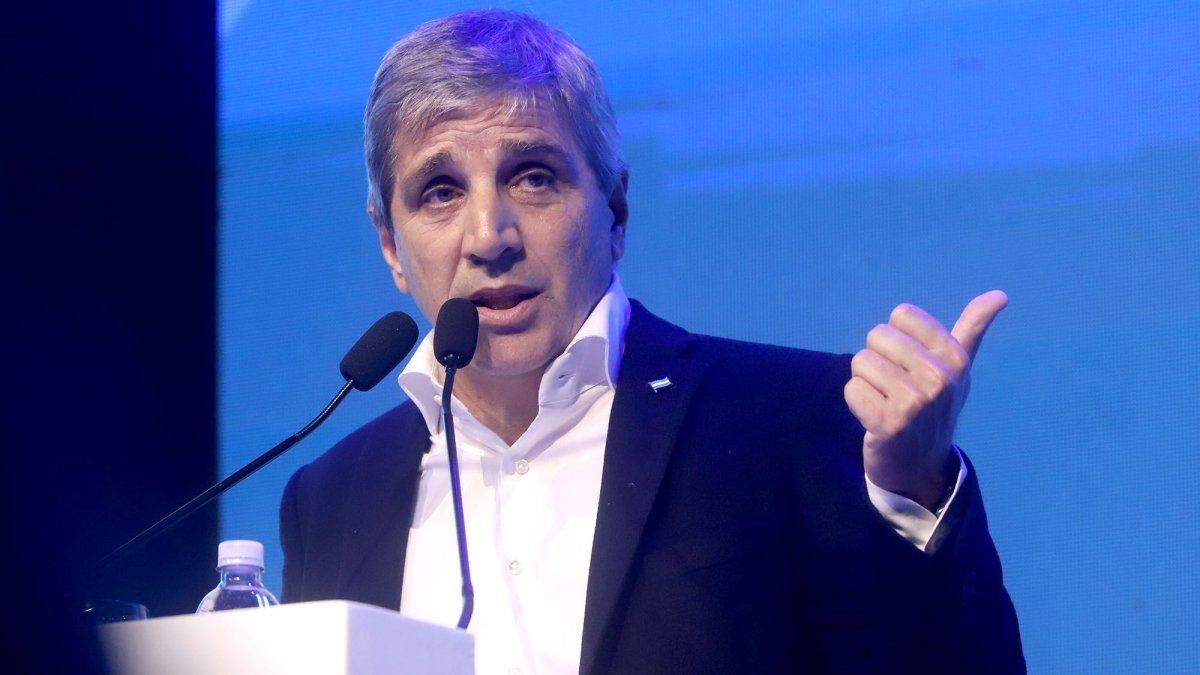He Minister Luis Caputo will be using a very unoriginal trick in the coming weeks to counter rumors of debt restructuring or default.
Aware that the agreement with the IMF, and it will probably take a few more weeks to sign off on a new programme, The minister is determined to seriously evaluate the possibility of taking out a loan with the guarantee of gold deposits transferred abroad from Argentina..
The data, confirmed yesterday by the BCRA itself, was anticipated by Luis Caputo himself in his first streaming program of the Ministry last Friday, which was hosted by Felipe Núñez, advisor to the portfolio, and co-hosted by Federico Furiase, director of the BCRA. There Luis Caputo said that “Argentina does not need to go to the markets and convince them” because it will not have to do so in the next year and a half“It will only be in January 2026, and then the reality will be overwhelming. At that time, it will be able to refinance its capital,” he said.
Another detail, a trick, must be added to the statement: Between the end of the current program with the IMF that will operate in December, and the signing of the new agreement, the Government will have a window where it does not need an agreement with the organization to take on debt or any line provided via collateral. This is the “window of opportunity” that the Government is waiting for to put the gold sent abroad “into play.”
Money laundering, dollar deposits and BCRA reserve requirements: more reserves?
In all cases, the Government fantasizes about the idea that there will indeed be a “rain of dollars” in the local financial system, not only due to the effect of money laundering and deposits in special accounts – it was announced that this money can be used without paying a fine via debit card – but also due to an essential element: the increase in dollar deposits and, therefore, in the reserve requirements of the BCRA.
Since January, the performance of deposits over US$20 million has shown an increase from US$1.5 billion to approximately US$2 billion today. The Government’s bet is that this segment – hard currency deposits – will grow even more from now on, which would enable the BCRA to show a higher level of reserves and, occasionally, use them to counteract growing demand.
IMF reopens: ninth review of Argentina’s program to begin soon
From now on, and for the next 16 months, The Government must manage, cancel or renew payments for US$22.6 billion. It is a chilling figure. The World Bank, IDB, sovereign bonds, Bopreal, CAF and the Paris Club are just some of the creditors waiting patiently in that queue. But the IMF is slipping down that line. Precisely, after worsening Argentina’s growth prospects for this year and predicting a 3.5% drop in economic activity, The IMF will open its “service window” this week to analyze the ninth review of the agreement with ArgentinaAt stake are $530 million, which the organization must disburse if the review is approved. The Fund is coming back from its summer recess, which was also accompanied by the Labor Day holiday in the United States yesterday.
According to sources from the Ministry of Economy, the talks will begin this week with an eye on the comparison and evaluation of the quarterly goals. The Government has just reduced the PAIS Tax and announced, with great expectation, that The one who could present the 2025 Budget in Congress is President Javier Milei himself. Why is it him this time? Sources say it is a direct shot at Kristalina Georgieva, head of the IMF and the US Treasury Department. “They want to reinforce the gesture of fiscal discipline to see if the next agreement comes quickly and with fresh money”they comment at the Treasury Palace.
It should be remembered that the IMF itself is one of the most enthusiastic about next year, since, in its Global Outlook report, it confirmed that in 2025 the Argentine economy will have a strong rebound, with an estimated growth of 5%, one of the most encouraging forecasts in the entire region. At the same time, the IMF is the first to be concerned about the scarce accumulation of reserves, the rain of dollars from exports in the financial dollar market and the policy of strengthening the peso.
Exchange rate competitiveness deflates
In any case, there is a lot of activity at the moment in the Government. The fact, as stated above, is that work is being done on various measures that would aim to guarantee resources for debt maturities that occur in the coming months without taking into account potential new funds from the IMF, something that is not easy to implement without arousing distrust among investors.
On the other hand, it is known – but silence remains – about a not insignificant detail: Despite the 118% jump in the dollar in December 2024, inflation has eaten away at the competitiveness gained and there are only a few weeks left before they are, once again, in the same place..
Source: Ambito
David William is a talented author who has made a name for himself in the world of writing. He is a professional author who writes on a wide range of topics, from general interest to opinion news. David is currently working as a writer at 24 hours worlds where he brings his unique perspective and in-depth research to his articles, making them both informative and engaging.




